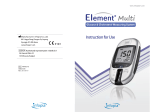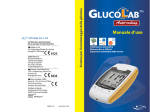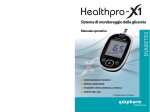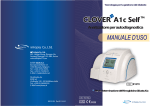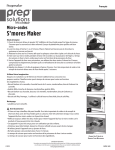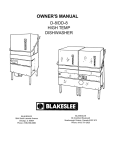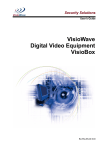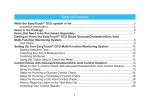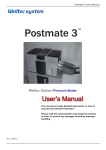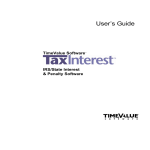Download GlucoLab™ Auto-coding Meter - Operation
Transcript
Lancet : Sae Han Med Corp. 973-16, Sungsuk-Dong, Ilsandong-Gu, Goyang-City, Gyeonggi-Do, Korea Lancing Device : GMMC Room No. 1112, Ace Tower 9th Bldg., 345-30, Kasan-Dong, Kumchon-Ku, Seoul, Korea CUSTOMER CARE LINE: 01376 500 720 http://neondiagnostics.co.uk/ INFM22AGB IMM20-520 Rev. 2013-05-06 Dear GLUCOLABTM Auto-coding Blood Glucose Monitoring System Owner Thank you for choosing the GLUCOLABTM Auto-coding Blood Glucose Monitoring System. This booklet has important information you need to know about the GLUCOLABTM Auto-coding Blood Glucose Monitoring System. Please read it carefully. We understand that self-testing of blood glucose level provides a way to control your diabetes and may give you peace of mind by testing regularly. As a result GLUCOLABTM Auto-coding was developed to provide you with a fast and accurate reading with a convenient and simple process. Our goal at GLUCOLABTM Auto-coding is to provide the best quality healthcare products coupled with superior customer service. Always consult with your healthcare professional before making any changes to your diabetes management. The GLUCOLABTM Auto-coding Blood Glucose Monitoring System is for in vitro diagnostic use only. Important information The GLUCOLABTM Auto-coding Blood Glucose Monitoring System is intended for use outside the body (in vitro diagnostic use only). It should be used only for testing blood glucose and only with fresh capillary whole blood samples. It should not be used for the diagnosis of diabetes. Consult your physician or diabetic healthcare professional about daily management of your diabetes and proper use of the glucometer. Please pay close attention when handling blood. Improper procedures may cause serious hazards to your health. Test Principle The enzyme glucose oxidase on the blood glucose test strip reads specifically with the blood glucose. The current generated is converted and displayed as blood glucose value. The GLUCOLABTM Auto-coding Blood Glucose Monitoring System is plasmacalibrated to allow easy comparison of results with laboratory methods. A blood glucose meter which is calibrated against a whole blood method may have different results in comparison to GLUCOLABTM Auto-coding. The laboratory system used for calibration of the GLUCOLABTM Auto-coding Blood Glucose Monitoring System is YSI 2300 STAT plus which is equipped with a glucose oxidase system. Note < Maintaining the GLUCOLABTM Auto-coding blood glucose test meter > 1. Do not assemble or disassemble the blood glucose test meter. 2. Please keep in a dry place. 3. Please keep clean and dry. 4. Please do not store in the same place as toxic chemicals or gases. 5. Keep out of direct sunlight. CAUTION 1. If the code of the blood glucose test meter and of the blood glucose test strip vial does not match, you must set the code number. 2. If the code on the LCD window and on the blood glucose test vial do not match, follow the coding procedure for accurate results. The GLUCOLABTM Auto-coding Blood Glucose Monitoring System contains small parts. Please keep your monitoring system out of reach of children. 4 www.infopia21.com 5 Intended use of GLUCOLABTM Auto-coding Blood Glucose Test Meter Contents 1. Learning the System Intended use of Blood Glucose Test Meter GLUCOLABTM Auto-coding Blood Glucose Monitoring System Kit Contents GLUCOLABTM Auto-coding Blood Glucose Test Meter GLUCOLABTM Auto-coding Blood Glucose Test Meter Display GLUCOLABTM Auto-coding Blood Glucose Test Strip Information 2. Before Testing 7 8 9 10 11-12 13-14 15 16-17 Setting the blood glucose test meter Auto-Coding Function Performing a Glucose control solution test 3. Testing Your Blood Glucose 18 19-21 22-24 26 Testing Your Blood-Preparation Collecting a Drop of Blood Testing Procedure Blood Glucose Test Strip Ejector Function 27 4. Reviewing Your Results 28 5. Alternate Site Testing 29-30 6. Performing a Blood Test using and Alternate Site 7. GLUCOLABTM Auto-coding Blood Glucose Test Meter Software 31 8. Taking Care of Your Blood Glucose Test Meter Cleaning Your Blood Glucose Test Meter and Maintenance Dispose of meter and batteries 9. Troubleshooting 10. Specifications 11. Conversion table mmol/L 12. Symbol reference 13. Warranty 6 www.infopia21.com mg/dL The GLUCOLAB Auto-codingTM Blood Glucose Monitoring System is intended for in vitro diagnostic use only. GLUCOLAB Auto-codingTM Blood Glucose Monitoring System is for self-testing. It should not be used for the diagnosis of diabetes or for the testing of newborns. The GLUCOLABTM Auto-coding was designed to test a blood glucose (sugar) level and can be used with a capillary whole blood sample. Do not use the GLUCOLABTM Auto-coding Blood Glucose Monitoring System for any purpose other than blood glucose testing. CAUTION : Before using any product, please read all instructions. Consult your physician or diabetic healthcare professional about daily management of your diabetes and proper use of the glucometer. If you have any questions about the GLUCOLABTM Auto-coding product, please contact Neon Diagnostics Ltd. Freephone patient helpline 0800 009 3378. 32 33 34-37 38 39 40 41 7 GLUCOLABTM Auto-coding Blood Glucose Monitoring System KIT Contents GLUCOLABTM Auto-coding Blood Glucose Test Meter Blood glucose test strip Port: Insert the GLUCOLABTM Autocoding blood glucose test strip here. Blood glucose test strip ejector Display Screen: Displays your test results, symbols and messages. Function Button: Powers the meter on/off, prompts memory data and acts as an enter button during setup and after tests. BLOOD GLUCOSE TEST METER For use with TM 1. GLUCOLAB Auto-coding Blood Glucose Test Meter 2. GLUCOLABTM Auto-coding Blood Glucose Test Strips 3. Lancing Device 4. Lancets 5. Operation Manual 6. Warranty Registration Card 7. Patient Logbook 8. Carrying Case 9. Two 3V Li-CR2032 Batteries 10. Control Solution Normal Your GLUCOLABTM Auto-coding Blood Glucose Monitoring System has been sealed and should contain all of the parts shown above. Please return the system to the place of purchase or contact your nearest GLUCOLABTM Auto-coding representative if the container seals are broken or parts are missing. 8 www.infopia21.com Up/Down Arrow Buttons: Adjusts setting, scrolls through memory Blood Glucose Test Strip only INFM22A Serial Number GL-5C13-1C0-03 Rev.2009-04 BLOOD GLUCOSE TEST METER Battery Cover Bd. General Wahis 53 1030 Brussels, Belgium GL-5C13-1C1-03 Rev.2009-04 CAUTION 1. Do not use GLUCOLABTM Auto-coding blood glucose test meter in a dry environment, especially if synthetic materials are present. Synthetic clothes, carpets, etc., may cause damaging static discharges in a dry environment. 2. Do not use GLUCOLABTM Auto-coding blood glucose test meter near cellular or cordless telephones, walkie talkies, garage door openers, radio transmitters, or other electrical or electrical equipment that are sources of electromagnetic radiation, as these may interfere with the proper operation of the blood glucose test meter. 9 GLUCOLABTM Auto-coding Blood Glucose Test Meter Display Low Battery Warning Symbol GLUCOLABTM Auto-coding Blood Glucose Test Strip Information Storage and Handling Caution 1. Keep out of direct sunlight. Strip Code Symbol 2. Store the GLUCOLABTM Auto-coding Blood Glucose Test Strip vials in a cool, dry place between 2-30°C (36-86? ). Do not freeze. Blood drop symbol for test 3. Make a note of the discard date on the vial label when you first open it. Discard remaining GLUCOLABTM Auto-coding blood glucose test strips 3 months after first opening the vial. Alarm Symbol Before Having a Meal After Having a Meal After Sports Activity After Taking Medication Temperature / Date Time / Test Result Amount Test Result Unit Symbol 4. Close the vial cap tightly immediately after removing a GLUCOLABTM Autocoding blood glucose test strip. 5. Do not use test strips after the expiration date printed on the package or vial as this may cause inaccurate results. 6. Avoid getting dirt, food or water on the blood glucose test strip. Do not bend, cut, or alter the GLUCOLABTM Auto-codingblood glucose test strip. 7. GLUCOLABTM Auto-coding blood glucose test strips are for single use only. 8. Keep the blood glucose test strip vial away from children. 9. Please refer to the user’s manual for GLUCOLABTM Auto-coding blood glucose test strip for additional information. 10. Discard the used blood glucose test strip carefully, to prevent any infection. Control Solution Symbol AVR Average Test Result System CHK Troubleshooting Symbol Use only GLUCOLABTM Auto-coding brand blood glucose test strips with your GLUCOLABTM Auto-coding blood glucose test meter. ? Apply Blood Target ? Confirmation Window 10 www.infopia21.com ? Contact Bar 11 GLUCOLABTM Auto-coding Blood Glucose Test Strip Information Limitations of Blood glucose measuring system : The blood glucose test strips provide accurate results when the following conditions are observed: - Use the GLUCOLABTM Auto-coding blood glucose test strips with the GLUCOLABTM Auto-coding blood glucose test meter or GLUCOLABTM blood glucose test meter. - Use fresh capillary whole blood only. - Do not use neonate samples. - The blood glucose test strips are for single use only. Do not reuse. - Dehydration may lower test results. - Inaccurate results may occur when in shock, hypotensive, hyperglycemic, or hyperosmolar state, with or without ketosis. - Blood glucose test strips used above altitudes of 10,000 feet will have an effect on test results. Doctors - Please note the following interferences that may affect test results : - GLUCOLABTM Auto-coding test strip results can be used with hematocrit levels in the range of 20% to 60%. If the hematocrit range is out of the range(20~60%), then the test results may be lower or higher than actual value. - Interferences : Acetaminophen, Uric and, Ascorbic acid (Vitamin C), and other reducing substances when occurring in normal blood or normal therapeutic concentrations do not significantly affect results. However, abnormally high concentrations may cause inaccurately high results. - Lipemic samples; Cholesterol up to 12.93mmol/L or triglyceride up to 33.9mmol/L do not significantly affect the results. Values beyond these levels should be interpreted with caution. - Blood samples that contain a high concentration of dissolved oxygen may lower the test result. Performance Characteristics : The performance of the blood glucose test strips has been evaluated in laboratory and in clinical tests. Measurement Range : The measurement range of the GLUCOLABTM Auto-coding Blood glucose measuring system is 0.5 to 33.3 mmol/L. 12 www.infopia21.com Setting Your Blood Glucose Test Meter The GLUCOLABTM Auto-coding Blood Glucose Test Meter has a variety of excellent functional modes; beep sound to alert when function is set, date, time, five daily alarms, ability to designate activities related to the test result, and the ability to designate three unique data averages. Power On User Activity Option Year Press at least. After pressing and releasing either ▲ or ▼ buttons to turn the user Activity option on/off, confirm with . After pressing and releasing either ▲ or ▼ buttons to set the year (from 2007 to 2099), confirm with . Date / Time Temperature unit After pressing and releasing either ▲ or ▼ buttons to set the date and time, confirm each with . Press and release either ▲ or ▼ buttons to set ℉ or ℃. Enter button. Number of days for average for 3 seconds After pressing and releasing either ▲ or ▼ buttons to set the number of days for average calculation (3 different possible), confirm with . 13 Setting Your Blood Glucose Test Meter Auto-Coding Function 1. GLUCOLABTM Auto-coding has automatic code recognition function. Alarm on/off After pressing and releasing either ? or ? buttons to turn the alarm on/off, confirm with . Alarm time Alarm After pressing and releasing either ? or ? buttons to set the alarm hour and minute, confirm with . After programming the number of desired alarms (5 alarms possible), confirm with . 2. It recognizes automatically the code number. This is a very convenient function preventing the inconvenience of setting the code number on the blood glucose test meter every time. CAUTION 1. **VERY IMPORTANT: Correct test unit. Your GLUCOLABTM Auto-coding blood glucose test meter is pre-set as mmol/L as test unit. An incorrect test unit will lead to an incorrect test result display. Please consult your healthcare professional if you’re not sure which test unit to use. Stored test results are displayed correctly after re-setting the test unit. See also conversion table on page 39. 2. Without setting the date properly, the average glucose level and the results in memory will not show proper values. It is recommended to set the blood glucose test meter before use and when new batteries are installed. 3. It is not possible to test your blood glucose in the setting mode. 4. To turn the meter off during setup, press for at least 5 seconds. 14 www.infopia21.com CAUTION 1. Do not bend the blood glucose test strip to prevent the Automatic code recognition failure. 2. If the code recognition label is damaged, the code recognition may fail. Please check the code number on the LCD window with the code number on the blood glucose test strip vial. 15 Performing a Glucose Control Solution Test The glucose control solution should be used when there is suspicion that the blood glucose test meter or the blood glucose test strips are not working properly. For example: if strips have been exposed to extreme conditions or if you drop the blood glucose test meter. Check the expiration date before performing a glucose control solution test. Do not used if expired. Once opened, solution expires after 3 months. The Glucose control solution should be used •Whenever you suspect the blood glucose test meter or blood glucose test strip is not functioning properly. •If your blood glucose test results are not consistent with your symptoms or if you think they are not accurate. •If you have dropped the blood glucose test meter. •For quality control in the point of care usage. •For teaching or learning the system. 1. Shake the glucose control solution before use. 2. Discard the 1st drop of glucose control solution, this will eliminate any residue. 3. Place a drop of glucose control solution on a clean dry surface (ex. The lid of the blood glucose test strip vial). 4. Insert a blood glucose test strip into the port and press the up arrow. A glucose control solution vial will appear on the bottom left hand side of the screen, above the date and time. This will allow you to differentiate between a glucose control solution test and an actual blood test for future reference. 5. Dip the blood glucose test strip into the glucose control solution. 6. Results appear in 5 seconds. 7. Compare the result to the range printed on the blood glucose test strip vial, the results should fall within that range. 8. If your glucose control solution falls out of range, do not perform a glucose test, please contact your local representative. 16 www.infopia21.com Performing a Glucose Control Solution Test Note: - GLUCOLABTM Auto-coding glucose control solution is sold separately. - It is recommended that glucose control solution is stored at room temperature 20~25℃(68~77℉) before testing. For example If you use a normal glucose control solution, you must use the normal range printed on the side of the blood glucose test strip vial. 1.9-3.6 4.4-6.7 14.2-19.2 • Results that fall outside the expected range may indicate: •Test not performed at room temperature. •An error in the way you are doing the test. •Expired or contaminated glucose control solution. •A problem with the blood glucose test meter. •Glucose control solution that is too warm or cold. •Failure to discard the first drop of glucose control solution and to wipe the bottle tip clean. •Failure to shake the glucose control solution adequately. CAUTION • If your glucose control solution falls out of range, do not perform a glucose test, please contact your local representative. • The Glucose Control Solution range is not the recommended range for your blood glucose level. 17 Testing Your Blood - Preparation Collecting a Drop of Blood Before testing, be sure to read this section and blood glucose test strip package insert found in the blood glucose test strip box carefully, Make sure you have all the necessary items to begin testing: The lancing device is a convenient medical tool for collecting capillary blood samples for glucose monitoring or other tests which require one or two drops of blood. As a more advanced lancing device, it provides ultimate safety and comfort for obtaining blood samples. An adjustable tip offers 5 levels of skin penetration for individual user’s comfort and a lancet ejector enables the safe disposal of the used lancet. As an added bonus it also has a transparent tip for AST (Alternative Site Testing). • GLUCOLABTM Auto-codingblood glucose test meter • GLUCOLABTM Auto-codingblood glucose test strip • Lancing Device • Sterile Lancets PRECAUTIONS •Never use a lancet that has been used by someone else. This could lead to contamination. •If the lancing device is to be used by another person, the unit must be properly disinfected and a new tip and lancet must be used. •Do not leave the lancet in the device after use. •A new lancet must only be placed into the lancing device directly before testing. •This device has many small parts and could be a choking hazard for children if swallowed. •In the case of hospital use, hospitals need to consult their own infection control protocols in order to avoid any contamination. •Always dispose of the used lancet in a biohazard garbage container. COMPONENTS Clear Tip Ejection System CAUTION To reduce risk of infection : 1. The lancing device and sterile lancets should NOT be shared with others. 2. Always use a new, sterile lancet and a new blood glucose test strip. 3. Practice using the Lancing Device and become accustomed with its use. 4. Lancets and blood glucose test strips are for single use only. 5. Wash your hands with warm, clean water and soap before testing. 6. Avoid getting hand lotion, oils, dirt or debris on the lancets or on the lancing device. 7. Dry your hands completely before testing. 18 www.infopia21.com Sliding Barrel Release Button Depth Indicator/Adjustable Tip Lancet Holder 19 Collecting a Drop of Blood Collecting a Drop of Blood RECOMMENDED AVAILABLE LANCETS Some general sterilized lancets are BD-Ultra Fine, Cleanlet Fine, E-Z Ject, G-P Lite, Microlet, Monolet, One Touch, Soft Touch, Therasense, Ultra TLC and Unilet GP. Please note: Some lesser known lancets may not work properly due to their dimensions. Please contact your representative to make sure that you are using proper lancets. 1. Unscrew the tip of the lanc- 2. With two fingers, pull out ing device by turning it countthe lancet carrier and hold it er-clockwise while holding in place. the base firmly. 3. While holding the lancet carrier, insert a new sterile lancet into the bottom of lancet carrier. USING THE CLEAR TIP (AST) 1. Place the clear tip in the skin at the chosen alternative site, press and hold the continuously for a few seconds, then push the release button to take a sample. 2. Watch through the clear tip until a sufficient blood sample is taken. If there is not enough blood, gently massage the area until a sufficient sample has been collected. STORAGE Products must be stored at room temperature protected from sunlight or moisture. 4. Twist the cap of the lancet off. 5. Put the tip of the lancing device back on and turn it clockwise. 6. Hold the tip firmly in one hand then pull out the sliding barrel with the other hand. This will load the lancing device. Click 7. Place the lancing device in place. Hold the firmly against the side of the finger, with the cap resting on the finger. (The harder it is pressed the deeper the puncture.) Press the release button to take a sample. CLEANING AND DISINFECTION Clean and wipe the outside of the lancing device a minimum of once a week with a soft cloth, dampened with mild soap and water. Wash the adjustable tip and the clear tip once a week with mild soap. Do not immerse in liquid. WARRANTY The lancing device has a 2-year warranty from the date of purchase. A malfunctioning device should be returned to the following address: 8. Unscrew the tip of the lancing device by turning it counter-clockwise. 9. Push the lancet ejector forward with the thumb and simultaneously pull out the sliding barrel to dispose of the used lancet in a proper biohazard container. Discard your Blood glucose test Lancet GMMC Room No. 1112, Ace Tower 9th Bldg., 345-30, Kasan-Dong, Kumchon-Ku, Seoul, South Korea Tel : +82 2 2104 0470 Fax : +82 2 2104 0472 GMMC, S.L. C/Jordi de S. Jordi 13, 6-23 46022 Valencia SPAIN Tel : +34 963 691 484 Fax: +34 961 125 949 U.K. Distributor: Neon Diagnostics Ltd. Untis 7&8, Swanbridge Industrial Park, Black Croft Road, Witham, Essex, CM8 3YN CUSTOMER CARE LINE: 01376 500 720 www.neondiagnostics.co.uk Push the needle into its protective cover. 20 www.infopia21.com pull the lancet out and discard appropriately. 21 Testing Procedure Testing Procedure Correct Completely Filled Note : Inserting the blood glucose test strip in the wrong direction will turn the blood glucose test meter on, but you will be unable to test. Caution 1. If the code is not displayed after for a while, pull the blood glucose test strip out of the port, and re-start the procedure from the beginning. 2. If the code on the LCD display window and on the test vial does not match, try another new blood glucose test strip. If the mismatch persists, please contact your local representative for help. 3. If the blood glucose test meter does not power on, pull the blood glucose test strip out of the port, and re-insert the blood glucose test strip. 4. Avoid testing under direct sunlight, for a more accurate test result. 5. If you apply your blood sample too early, ERROR5 message will appear on LCD ( refer to p35). • For a more accurate test result avoid testing under direct sunlight. 22 www.infopia21.com Correct Incorrect Step 1 •Firmly insert the blood glucose test strip into the blood glucose test meter port with the “infopia” facing towards you. •The blood glucose test meter automatically turns on displaying the code, ambient temperature and the date and time. •The GLUCOLABTM Auto-coding will automatically recognize the blood glucose test strip code number and adjust the blood glucose test meter accordingly. •A blinking blood glucose test strip will appear at the top of the screen indicating the blood glucose test meter is ready for testing. Applying Blood Incorrect Poorly filled •GLUCOLABTM Auto-coding blood glucose test meter only requires ㎕ sample volume. 1.0㎕ •Apply your blood to the glucose test strip and do not take off your finger until you get the beep sound.The test will automatically start. Step 2 •Place the top edge of the blood glucose test strip to the area you prepared for testing. •The blood will automatically be “drawn” into the blood glucose test strip channel. •When the chamber has enough blood, your blood glucose test meter will automatically count down. Caution 1. If the countdown does not start, do not add more blood to the blood glucose test strip! Discard the blood glucose test strip an restart testing. 2. If you do not conduct the test within 3 minutes, the blood glucose test meter will automatically power off to save battery life. In this case the test procedure should start again from the beginning. 3. You may get an inaccurate result if the blood sample is not completely filled in a single action. 23 Testing Your Blood - Case of Setting User Option Testing Procedure Step 4 •If you selected to use the User Activity option during set up, press ▲ and ▼ button to select the activity that correlates with your result (refer to p10), then press . mmol/L Step 3 •After the beeping sound, the test will begin automatically and your results will appear in 5 seconds. It should begin counting down from 5 to 1 second on the LCD display window. The LCD window will display the result of your blood glucose level, temperature and time. •Record the result value in your logbook. When blood glucose test strip is removed, the blood glucose test meter turns off automatically. CAUTION 1. If the test result is out of the test range, the Hi/Lo message will be shown on the LCD. (refer to p35) 2. Safely discard used blood glucose test strip and lancet, to a proper place, according to the local regulation. 24 www.infopia21.com 25 Test Strip Ejector Function Reviewing Your Result The GLUCOLABTM Auto-coding blood glucose test meter stores up to 500 test results in its built-in memory, along with the average sugar level for the number of days which you had preset the blood glucose test meter to calculate. These values can be recalled in the LCD display at any time. •Check your previous result by pressing the arrow ▼ button. •Check your average data by pressing the arrow ▲ button. Press and Push forward Eject your blood glucose test strip 1. Once the test is complete, slide the ejector button forward to remove the blood glu- The third latest The second latest The latest 7day average from the test date 14 day average from the test date 21day average from the test date cose test strip from the blood glucose test meter. 2. Discard the used blood glucose test strip and lancet accordingly. CAUTION 1. If you push the ejector button too far forward, it may malfunction. 2. Strong impacts may result in a malfunction of the blood glucose meter. 26 www.infopia21.com Average test result Test Unit Test result amount Average test result days 27 Alternate Site Testing Performing a Blood Test Using and Alternate Site Upper Arm Forearm Dorsal Hand Ventral Palm Performing a Blood Test Using an Alternate Site To ensure accurate results when lancing your forearm, upper arm, hand, thigh, or calf, wash the test site with soap and water. Make sure there is no cream or lotion on the test site.Thoroughly dry your hands and test site. Fingertips Thigh Calf Important Information About Using Alternative Sites Testing : • Alternate sites where you can test are dorsal hand, ventral palm, upper arm, forearm, calf, and thigh. • Under certain conditions, blood glucose test results obtained using samples taken from your alternate sites may differ significantly from fingertip samples • The conditions in which these differences are more likely to occur are when your blood glucose is changing rapidly such as following a meal, as insulin dose, or associated with physical exercise. • When blood glucose is changing rapidly, fingertip samples show these changes more quickly than alternate sites samples. • When your blood glucose is falling, testing with a fingertip sample may identify a hypoglycemic (low blood glucose) level sooner than a test with a alternate sites sample. • Use alternate sites samples only for testing prior to or more than two hours after meal, insulin doses, or physical exercise. • Testing performed within two hours after meals, insulin doses, or physical exercise or whenever you feel that your glucose levels may be changing rapidly should be done from the fingertip. • You should also use fingertip testing whenever you have a concern about hypoglycemia (insulin reactions) such as when driving a car, particularly if you suffer from hypoglycemic unawareness (lack of symptom to indicate as insulin reaction), as forearm testing may fail to detect hypoglycemia. Important : We recommend that you test on your fingertips if you are testing for hypoglycemia (low blood glucose) or if you are suffering from hypoglycemia unawareness. 28 www.infopia21.com CAUTION •To receive accurate test results, at least 1.0㎕ minimum sample volume is required. 29 Performing a Blood Test Using and Alternate Site GLUCOLABTM Auto-coding Blood Glucose Test Meter Software To bring fresh blood to the surface of the test site, rub the test site vigorously for a few seconds until you feel it getting warm. You can transfer test results from the GLUCOLAB Auto-coding blood glucose test meter to a computer. Lance the test site with the lancing device: 1. Hold the clear cap down against the top of your test site. Press the release button. Do not lift up. 2. Continue to hold the lancing device and gradually increase pressure for several seconds. TM You can download the software from our web site. (www.neondiagnostics.co.uk) You can purchase the computer communication cable separately from a local representative. [User] [PC] 3. While holding the lancing device on your test site, look through the clear cap; until a drop of blood appears approximate • size 4. Lift the lancing device straight up; be careful not to smear the blood on your testing site. 5. Place the edge of the blood glucose test strip to the drop of blood. cable 6. The blood will automatically draw into the channel of the blood glucose test strip. You may get an inaccurate result if the blood sample is not completely filled in a single action. 30 www.infopia21.com 31 Cleaning Your Meter and Maintenance Replacing the Batteries Blood glucose test meter : Your blood glucose test meter does not require special maintenance or cleaning. avoid getting dirt, dust, blood, glucose control solution, or liquids on the blood glucose test meter, the test port, or data port. Your blood glucose test meter operation temperature is 10~40℃(50~104℉). It is recommended that you store the blood glucose test meter in its carrying case after each use. A cloth dampened with water and mild detergent can be used to wipe down the outside of the blood glucose test meter. Your GLUCOLABTM Auto-coding blood glucose test meter is a precision instrument. Please handle it with care. The low battery icon will appear in the upper left corner of the LCD screen to alert you when the battery power is running low, indicating a new battery is needed. Lancing Device: Clean the lancet device and caps with soap and tepid water. To disinfect the lancet device, prepare a disinfectant solution of one part household bleach to 10 parts water. Dampen a cloth with this solution and wipe the lancet device thoroughly. Soak only the cap for at least 30 minutes in the disinfectant solution. Do not soak the lancet device in liquid. Rinse the lance device and cap with water and dry thoroughly. •For detailed instructions concerning GLUCOLABTM Auto-coding blood glucose test strips, refer to the blood glucose test strip package insert found in the blood glucose test strip box. •Please store the GLUCOLABTM Auto-coding blood glucose measuring system in a cool, dry area, out of reach of children. Do not freeze. For a more accurate test result avoid testing under direct sunlight. •Do not soak the blood glucose test meter orblood glucose test strips in water or liquid. •Do not subject the meter or blood glucose test strips to excessive heat. •Use your meter according to the instructions in the manual. •If you need to purchase the lancing device, lancets or blood glucose test strips, contact your local representative. •Discard the used Lancets carefully, to prevent any infection. 32 www.infopia21.com Your GLUCOLABTM Auto-coding blood glucose test meter uses only two 3V Lithium batteries (CR2032), which are included. When replacing the batteries, only CR2032 or equivalent lithium battery should be used. After changing the batteries, please be sure to recheck your blood glucose test meter settings. Dispose of meter and batteries Dispose of meter: The meter must be disposed of according to the local regulations concerning the disposal of electrical and electronic equipment. The Waste Electrical and Electronic Equipment(WEEE) regulation implement provisions of the European Parliament and Council Directive 2012/19/EU aimed to reducing the amount of EEE waste going for final disposal. The manufacturer, has specific instructions for the recovery of the meter. Please contact your distributor. Dispose of batteries : Please recycle or dispose of used batteries using your local battery collection systems and in compliance with your local environmental laws and regulations. Batteries contain chemicals that, if released, may affect the environment and human health. The crossed-out wheeled-bin symbol indicates the need for the separate collection for batteries. <Follow-up Action> 1. Check your meter with the glucose control solution (p16-17) 2. Perform your test again (p22 - 24) 3. If you are experiencing symptoms that are not consistent with your blood glucose test results, call your healthcare professional. CAUTION Remove both batteries from the compartment and dispose of them according your institution's guidelines. 33 Troubleshooting Troubleshooting The following chart may help you identify certain problems, but may not solve all Message Problem Action Required User applied the blood sample before the LCD display was blinking Please wait for the LCD to display icon blinking before applying your blood sample problems that can occur. Please contact your local representative or customer support if the problem persists. Problem Action Required Problem with the blood glucose test meter Place the battery again, and set the blood glucose test meter. If the problem persists, please contact your authorized representative or customer support Message Caused by either used or wet blood glucose test strip Please insert a new blood glucose test strip and perform your test again Problem with the test strip Please insert a new test strip and apply the blood sample until confirmation window is completely filled. Blood glucose test strip is damaged 34 www.infopia21.com Please insert a new blood glucose test strip and perform your test again Problem with the Auto-coding label Please insert a new test strip and perform your test again. If Er6 message persists, please contact your local representative. If blinks with "SUN", avoid to the direct sunlight and retest. The ambient tempera- Place the blood glucose test meter within the operating ture is too low temperature range for 10 minutes or more and retest. The ambient tem- Place the meter within the perature is too high operating temperature range for 10 minutes or more and retest. The test result is lower than 0.5 mmol/L Check the accuracy of your blood glucose test strip by performing a glucose control solution test. If the test results in a normal reading, re-test your blood sample two or three times. If "Lo" persists, consult your doctor immediately. 35 Troubleshooting Troubleshooting Problem Action Required The test result is higher than 33.3 mmol/L Check the accuracy of your blood glucose test strip by performing a glucose control solution test. If the test results in a normal reading, re-test your blood sample two or three times. If "Hi" persists, consult your doctor immediately. Message The blood glucose test meter does not power on Battery is dead or there is a problem with the blood glucose test meter Change the battery and if the problem persist, contact your local representative (refer to the P.33) Test does not start after applying blood sample Poor blood sample Please insert a new blood glucose test strip and perform your test again The result is inconsistent There may be a problem with the blood glucose test strip Please insert a new blood glucose test strip and perform your test again Message Problem Low battery Battery needs replacing. For your free replacement batteries, please contact Neon Diagnostics Ltd. Freephone Patient Helpline: 0800 009 3378 Low battery Battery needs replacing. For your free replacement batteries, please contact Neon Diagnostics Ltd. Freephone Patient Helpline: 0800 009 3378 Low battery symbol appears in the upper left corner of the LCD screen Low battery warning symbol and 3 digit code Action Required No readings in memory to display Not enough readings in memory to display designated averages 36 www.infopia21.com 37 Conversion table mmol/L Specifications Sample type Capillary whole blood Sample volume 1.0ul Test Range 0.55 ~ 33.3 mmol/L Reading time mg/d/L mmol/L 0.55 1.0 1.5 2.0 2.2 2.5 2.8 3.0 mg/dL 10 18 27 36 40 45 50 54 5 seconds mmol/L 3.3 3.9 4.0 4.4 4.7 5.0 5.5 6.0 Calibration Plasma - Equivalent mg/dL 60 70 72 80 85 100 108 110 Altitude ≤ 3048m (10,000 feet ) mmol/L 10-40? (50-104? ) 6.7 7.0 7.2 7.5 7.8 Operating Temperature mg/dL 120 126 130 135 140 145 Operating Humidity 10-90% Strip storage temperature 2-30? (35.6-86? ) mmol/L 9.0 9.4 10.0 10.5 11.0 11.1 12.0 12.5 13.9 Display Type LCD mg/dL 162 170 180 190 Dimension 85 X 50.5 X 19.34 (mm) mmol/L 14.4 15.0 16.0 16.6 17.0 18.0 19.0 20.0 Weight 49g ( Including Battery) mg/dL 260 Power rating 3 V Li Battery (CR2032) X 2 Battery Life One year after purchasing mmol/L 20.8 22.2 23.0 24.0 25.0 26.4 27.7 30.0 33.3 PC communications port Communication is available to connect computer with cable mg/dL 375 400 38 www.infopia21.com 270 288 414 90 8.0 196 200 300 306 432 450 475 8.3 6.1 8.9 150 160 216 225 250 325 342 360 500 540 600 39 Symbol Reference Symbol Description Consult Instructions for use Used By This product fulfills the requirements of Directive 98/79/EC on in vitro diagnostic medical devices Attention, See Instructions for use For In Vitro Diagnostic Use Batch code Catalogue Number Temperature limitation Do not reuse SN Serial number Date of Manufacture Manufacturer Warranty Three - Year Warranty If, at any time during the first three years after purchase the blood glucose test meter does not work for any reason with the exception of obvious abuse, misuse, or disastrous damage, NEON DIAGNOSTICS LTD will replace your GLUCOLABTM Auto-coding cose test meter or equivalent free of charge. The Warranty Policy of NEON DIAGNOSTICS LTD applies to the original purchaser of the blood glucose test meter and include the batteries supplied with the blood glucose meter set. Please fill in the warranty card attached to the set. Mail or fax it back to us. The GLUCOLABTM Auto-coding blood glucose test meter has a full three-year warranty from the original date of your purchase. For your convenience, please include your date and place of purchase. Keep away from sunlight Self-testing Used Waste electrical and electronic equipment Authorized representative in the European Community Waste batteries and accumulators Biohazard 40 www.infopia21.com 41 MEMO 42 www.infopia21.com MEMO 43
























